
4X strategy. You may have heard of the term. It stands for: eXplore, eXpand, eXploit, eXterminate. They are a specific genre of strategy game. Today we are going to talk about them and how Galactic Civilizations III: Crusade, aims to innovate the genre.
Besides 4X, there are other genres: Real-Time Strategy games (RTS), such as Ashes of the Singularity and StarCraft, focus on harvesting resources to build units in order to destroy the enemy with it all happening in real-time. Grand Strategy Games (GSG), such as Stellaris and Europa Universalis, tend to use continuous turns (similar to real-time) with the action focusing at the nation state (or galactic state) level.
The best known 4X game of all time is, by far, Sid Meier's Civilization. 4X games are typically turn-based (with the exception of Sins of a Solar Empire) and typically revolve around balancing finite resources in order to make "interesting choices."
The ideal 4X game would be one in which each turn presents an interesting choice to the player. In Sid Meier's Civilization, the player is quickly confronted with a series of interesting choices when it comes to the first technology they research, the first unit they build, where they settle their first city; each decision leads to the next. Each game develops a natural evolution from exploring the world in order to know where the resources are, to expanding into the world to capture those resources, to exploiting the resources you have - and then exterminating all those who oppose you - 4X.
Sid Meier's Civilization is a historical 4X that starts with the first humans leaving their hunting and gathering ways. Galactic Civilizations begins the moment people leave the Earth to colonize new worlds. Unlike with a historical 4X, a future-based 4X has the challenge of making the alien approachable. For example, not only do we have to explain what antimatter is, but why you would want it.
Today, we will talk about how Stardock's mega expansion, Galactic Civilizations III: Crusade (Crusade), will tackle the nature of future resources; but also how such resources allow us to explode the final act of the genre to resolve the age old "late game grind" problem.
Explore
If I were to describe the fundamental difference between Crusade and Galactic Civilizations III, it would be that Crusade is all about resources and how you use them. Where the base game was largely about building a galactic civilization and the productive capacity of your people towards your strategic ends, Crusade couples that with the importance of resources and having access to them.
As I am fond to saying to my fellow World War II history buffs, it's not like Germany could just rush buy another Panzer division.
In Crusade, almost everything requires access to a resource; colonizing a bunch of planets and having a huge population won't be enough. You will have to own, beg, borrow or steal critical resources to succeed.

NEW in Crusade: You can see what resources are on a planet before you colonize it.
In the base game, the planet class (a number from 1 to 20) was the driving factor of whether you wanted that planet or not. The higher the number, the higher the population it could support. The higher the population, the more it could produce. In Crusade, players can also see what special resources are on the planet before colonizing. Suddenly, that class 9 planet with Techapod Hives on it might be more valuable than the class 14 planet next door.

Turn 1
No more starbase spam and no more colony rush
The first thing a GalCiv III player will notice is that Constructors, Colony Ships, and Survey Ships now use Administrative resources. Your time, or I should say, the time of your various minions, is finite. This should be obvious but we have not included minion time (administration) as a resource in this manner before. Thus, the early part of a Galactic Civilizations game was two fold: Rush build as many colony ships as you could provided you had good planets for them to go to, and rush build constructors otherwise.
But if I start with only 4 administrative resources, what should I build first? Now you have to make some interesting decisions, especially since Survey Ships are now buildable from the start and the galaxy is littered with cargo-containers containing trace amounts of resources waiting to be picked up.
How do you get more administrative resources? In the Galactic Citizens article, we discussed how you can now train citizens to be Administrators. Every so often, a citizen emerges and you can specialize him or her into a particular category based on what technologies you have. If you want to have lots of starbases, survey ships and colonies, then you will need to train a lot of Administrators. But training an Administrator means not training a Spy, or a Diplomat, or an Engineer, or a Scientist, or a Commander, or a General or any number of other specialists.

Citizens determine how your resources are used.
Now, still on turn 1 I look at my randomly generated map playing as the humans. In this game, I got a great start: Earth and Mars both have rare resources on them (or like those reading this, I restarted the game until I got my super mega awesome start...).

Still Turn 1 you have access to some interesting resources
Techapods aren't space horses. For one thing, they're on planets. For another...they, um...well, shut up. That's what. Seriously, Techapods aren't new in the GalCiv universe but they were previously just an abstract trade resource. In Crusade, a resource is a resource is a resource. The idea behind Techapods is that if we could find a super robust alien creature that was highly trainable we would totally use them.
The early part of a 4X is about exploring. As I uncover the galactic fog I begin to see various types of interstellar resources, as well as some planets that have their own special resources. Should I rush buy a colony ship to get the planet or rush buy the constructor to claim the precious interstellar resources?
Expand
The second act in a 4X game is expanding - that is, claiming territory; this is done through colony ships and constructors. In Crusade, constructors build starbases but are not required to upgrade them anymore.

Administrators are required for both colonies and starbases.
Colonizing planets gives you ownership of that planet's resources and starbases give you control of nearby interstellar resources. Planets produce a variety of resources based on what you build on the planet.

The 6 standard resources of a planet
Crusade changes the way food is used: In the base game, food is a local resource that determines a planet's population cap. In Crusade, food is a global resource that is consumed by cities that can be on other planets.

My Food planet

My City Planet
And then there are the rare resources found only on planets. Techapods is a rare resource mentioned earlier. Below is an incomplete list of some of the other resources you might find.

There are a lot of resources in the galaxy. You may play many games before you find them all.
We'll talk more about these in a bit.
The Expand phase of 4X games ends when most or all of the planets and resources have been claimed. In a well designed 4X game, the Explore and Expand phases are very enjoyable and make the player feel like he's had to make some challenging decisions. The next phase is when players begin to execute their particular strategies for victory: Exploitation of their resources.
Exploit
The lines have been drawn. The territories claimed. Through diplomacy, warfare, trade or other means players must begin executing the strategy they believe will lead them to victory. Exploit represents the exploitation of resources human or otherwise.
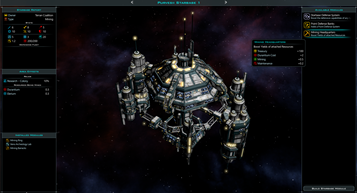
In Crusade, starbases construct their modules locally. If you have the necessary resources, you can build it.
Your planets are now producing resources each turn that go into your global inventory. Similarly, your starbases are mining resources to go into your inventory as well.
One big change from the base game is that in Crusade, starbases are upgraded directly. Since resources accumulate each turn, players can, over time, upgrade their starbases provided they have access to the necessary resource. A good player may stock a lot of resources, build a group of constructors with a large fleet, and build a massive forward base as a prelude to war.
But what happens if you don't have legitimate access to a given resource? Fear not, Crusade has a new strategy: Scavenging. The galaxy is littered with cargo containers that have...been misplaced. When one is collected, another one is usually spawned somewhere else. Thus, constructing a fleet of survey ships is now a viable strategy for obtaining resources because these cargo containers often contain trace amounts of various resources. The player who wants to win via other means than direct warfare can be competitive this way.
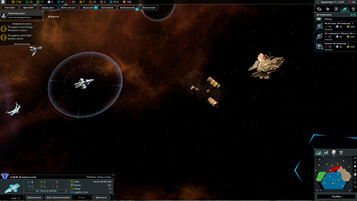
Cargo containers often contain trace amounts of a given resource.
What resources you have access to will impact what strategies you employ. Each interstellar resource has a particular purpose:
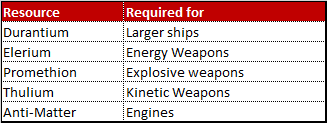
Suddenly, a good trade agreement providing resources per turn suddenly makes sense. Diplomacy stops being about ripping off aliens for their money and instead negotiating resource treaties that, by their nature, cannot be exploited by humans.
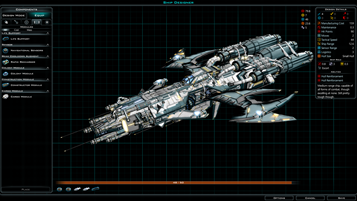
As much as you might want to build that cruiser with 35 moves per turn, doing so might consume most of your antimatter. On the other hand, suddenly strike forces with constructors that can build hyper lanes, start to make more sense provided you can protect the starbases that provide them.
As cool as the Citizen system and resource system is, it has the added benefit of drastically reducing micromanagement. You can hyper-specialize your planets without feeling like you're cheesing the game because you are doing it through means you earned and doing so in a way that doesn't require constant tinkering.
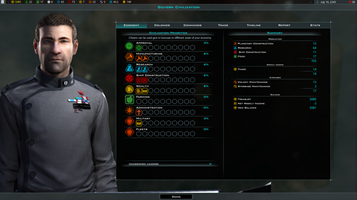
With Citizens, you have much more direct control of your resources without the micro-management.
At this stage you have leveraged your resources to execute your strategy. Victory means destroying the opposition. You can win in Galactic Civilizations through a variety of means: Ascension, Conquest, Diplomatic and Culture. But in any case, victory means eliminating those who oppose you one way or the other.
Exterminate
How a 4X game handles its last act determines whether it will be remembered as a classic or as a boring slog. One classic 4X - Master of Orion 2 - is well loved 20 years after release, partially because of how well it handled its final act. In that game, they meant extermination quite literally as players would race to various planets dropping biological weapons. Good times.
Crusade provides new strategic avenues to execute your strategy...decisively.
To recap:
-
Crusade introduces Citizens. These are units that occasionally arrive that you can specialize into a number of different areas based on your strategy.
-
Crusade also introduces accumulating resources of varying degrees of rarity.
Late game, you are probably either in a desperate fight for survival, looking for a miracle, or in a position of power looking for a swift and satisfying triumph. To deliver your miracle and/or decisive blow, we combine citizens and resources together to deliver a series of super abilities that can be activated by sacrificing a citizen along with a lot of resources.
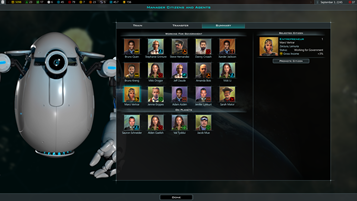
Pick a Citizen and...retire them.
We euphemistically refer to this as "Promoting" but in essence, you can spend a bunch of accumulated resources and based on your ideology, sacrifice a citizen to activate a one-time super power.
Note: Screenshots here are still a work in progress, the final game will look a bit different and have different descriptions.
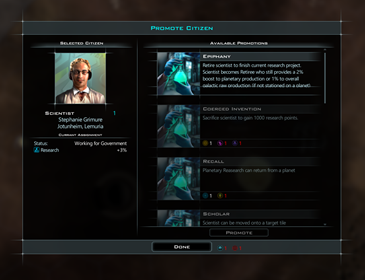
Have a scientist? Spend some nanites and antimatter and instantly get that technology you previously needed 90 turns for in exchange for retiring him.
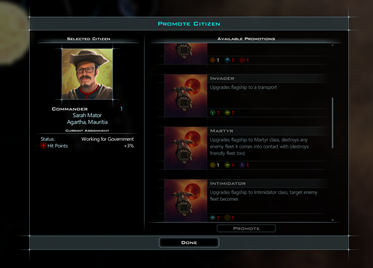
Fighting a desperate war? Sacrifice your Commander for the cause by having him single handedly destroy an entire enemy fleet (provided you have the resources and the right ideology) .
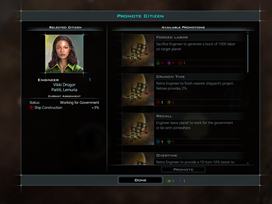
At last, you can finally work your people to death in a video game...
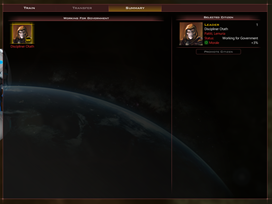
...Doubly true if you play as the Drengin Empire.
And of course, Spies. We'll have a whole Dev Diary dedicated to them.
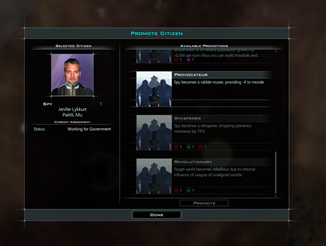
Depending on your ideology, there are some pretty horrible things you can do with your Spies provided you have the right resources.
Every Citizen specialty has multiple super powers that they can use. Often, using that power means sacrificing them or at least retiring them. Sometimes it's a power that can be used over and over. It just depends on what resources you have, how much you have, and what your dominant ideology is. The ideology part matters because a benevolent civilization will not be able to use their spy to poison the atmosphere of a target world; and a malevolent civilization won't be able to access some of the cool influence super powers.
Through this combination, rather than the late game being a slog, it instead begins to wrap up in a very satisfying manner. The player dominating the game will be able to use their resource advantage to bring the game to a swift conclusion. Or the crafty underdog may be able to make a bold move through sacrificing their citizens to bring them back into the game or alternatively act as a spoiler.
Aftermath
What has made the 4X genre so compelling over the years is that they are a sandbox for the imagination. Each game is a story complete with a beginning, a middle and an end with the narrative told not through in-game tidbits, but through your actions and deeds. What Galactic Civilizations III: Crusade aims to do is give you more pages for your story.
Your story is told through your choices:
-
When your scout ship first finds that antimatter node slowly revolving around a black hole, what will you do? Will you rush to construct a starbase so that you can claim it before someone else? If you do, does that mean you're going to focus on being the civilization with the faster ships? Or maybe the civilization with greater manufacturing production?
-
When your colony ship arrives at Proxima Centauri and discovers there is a race of primitive, but intelligent creatures, are you going to leave them alone? Even if it means giving up the Aerilu crystals they currently worship, but would be incredibly useful to your Engineers now and your Spies later?
-
How will you vote when the United Planets decides whether a refugee Scientist from the Arcean Empire wants asylum with your enemies, the Thalan? Voting no means certain death (but better relations with the Arceans), and voting yes means the Thalan now have another scientist to use against you; and you happen to know that the Thalan have access to Ithix spores and probably a spy on Aven Prime?
Galactic Civilizations III: Crusade will be coming out this Spring. Please feel free to ask questions and comment below.
Further Reading
Guns Germs and Steel
A Short History of Nearly Everything
Wealth and Poverty of Nations
Sid Meier: 4X games are a series of interesting decisions
About the Author
Brad Wardell is the founder and CEO of Stardock. He designed Galactic Civilizations I and Galactic Civilizations II and has returned to co-design Galactic Civilizations III: Crusade. His home page is www.littletinyfrogs.com.